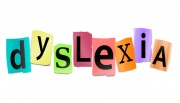Contents |
Introduction
Dyslexia is a specific reading disability which causes difficulty in processing visual information related to reading. It can be considered as a part of a general learning disability or it can exist on its own.
Dyslexia has nothing at all to do with intelligence; in fact, most dyslexics have normal or above-normal intelligence and can understand material when it is read to them rather than when they are required to read it. In other words, their auditory learning ability is normal or even enhanced over visual learning.
People with dyslexia are not merely slow readers. Even when they see the words clearly, the brain isn’t able to process the information in a way that permits them to understand what they read. Not all dyslexics have exactly the same type of processing problems; some may transpose letters back to front or read short words as if they were reversed (perceiving a small “d” as a “b” or “b-a-t” as “t-a-b”). Others perceive letters in the correct order but do not connect them into words, or connect words into meaningful sentences.
The interchanging of letters or numbers and the inability to process them properly is thought to be associated with anomalous connections within the brain. The condition seems to run in families, so may have a genetic basis; in other cases, mild brain damage from a difficult birth or infection with high fever may be the underlying cause.
Most of us who read well take the skill for granted, but it is actually a very complex ability. The reader must be able to track accurately across a line of print, keep the letters in focus and make accurate jumps from the end of one line to the beginning of the next. A child learning to read must possess these vision skills and have the level of maturation so as to be ready, perceptually, to read. Sometimes, reading difficulties can be the result of a child simply needing more time to allow the brain to make the proper connections. Some children diagnosed as dyslexics may merely have delayed maturation and do not actually have this learning disability.
Symptoms and Signs
Some indicators of dyslexia may include:
- A tendency to hide reading problems
- Refusing to read or write
- Poor spelling
- A reliance on others to correct mistakes
- High competence in spoken language
- Reliance on memory rather than list-making
- High creativity
- Reliance on auditory sources of information
- Difficulty learning unfamiliar words
- Low self-esteem
- Misbehaviour in structured situations like a classroom
- Emotional problems
- High frustration level
Dyslexia is not diagnosed by a vision examination, but it is necessary to rule out a dysfunction of visual skills that may be making reading even more difficult, such as the inability to track accurately across a line of print. Also, it is necessary to correct refractive errors like farsightedness or astigmatism and to make sure there is no strabismus or amblyopia present.
Treatment
Once common vision disorders have been ruled out or corrected, specific testing should be done by experienced professionals; such a team may include a neurologist and a reading instructor. Testing for the specific type of reading disability is important to tailor an educational program to suit the individual. With good teaching, most dyslexic children can be taught to read, though they may not ever become really good or avid readers. It is also possible for them to develop other learning skills to compensate for poor reading.
A dyslexic child can be taught in a different way since his or her brain visualizes in shapes and images rather than with words or letters. There are many different teaching methods available, but professional help will be needed to determine the right one for a given individual.
Summary
The stigma of being learning disabled or having dyslexia has decreased considerably over the last few decades and is no longer considered an impediment to success in life. Many schools offer educational programs to help improve reading or alternate learning methods such as auditory rather than visual skills.
Children with this type of learning disability should never worry about failure caused by dyslexia; a list of famous dyslexics includes Walt Disney, Thomas Edison, John Lennon and Albert Einstein.
Rule out vision problems with a comprehensive examination by an eyecare practitioner, then have testing done by qualified learning specialists to find the best way to overcome the problem in an individual way. Finally, place high value on other aspects of a child’s abilities such as art or musical talents; not everyone needs to be a CEO or needs to get a graduate degree in literature.






